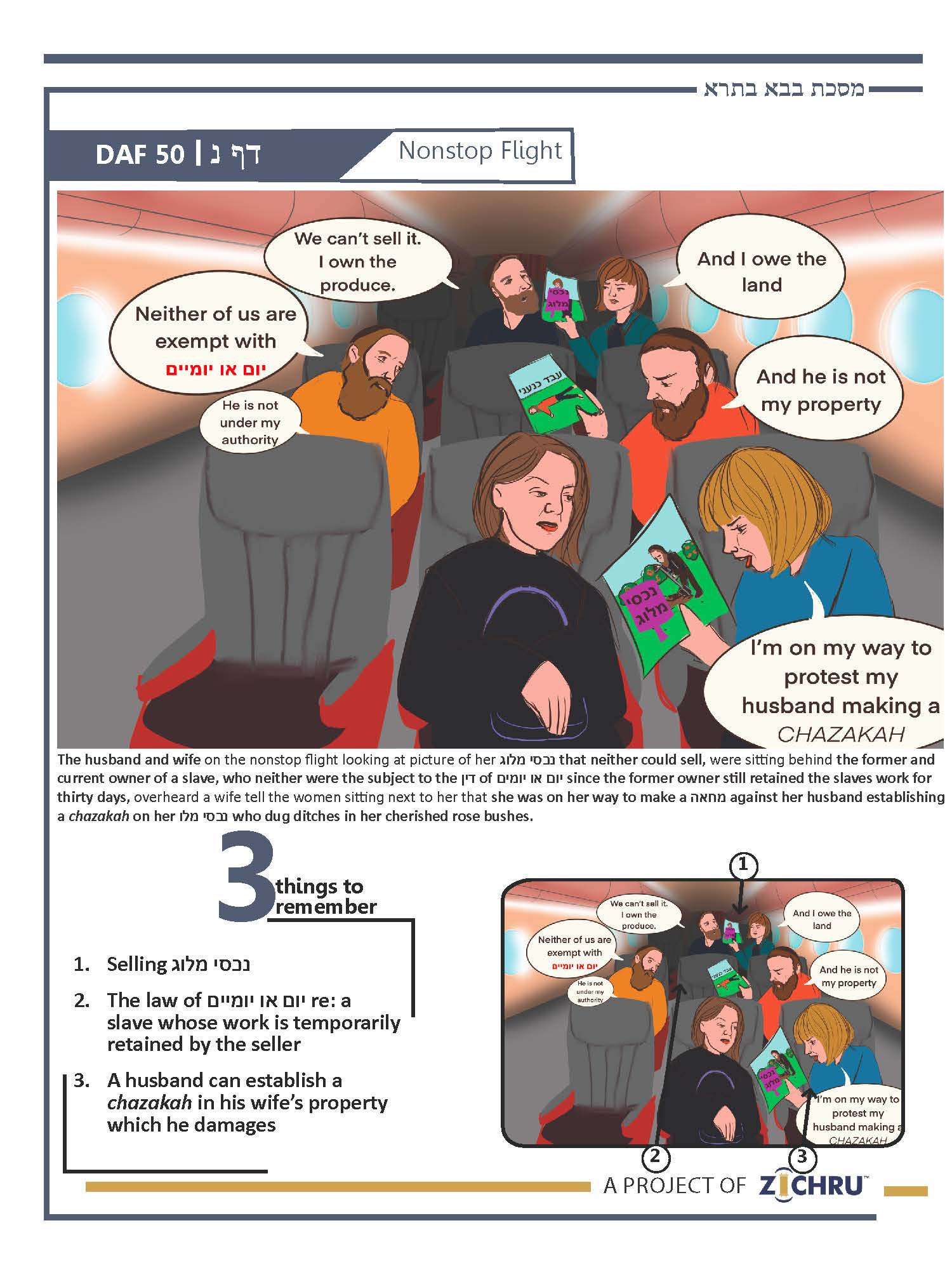- Audio Timestamps
0:00 - The 3 Sugyos
3:06 - Review of 3 Sugyos
6:04- Siman
8:44 - 4 Blatt Back Chazarah
17:09 - Pop Quiz (Last 7 blatt)
For access to all Zichru resources including PDFs, and illustrations CLICK HERE
- Selling נכסי מלוג
The Gemara said that a woman can sell her נכסי מלוג to her husband. This is challenged from Ameimar’s ruling: איש ואשה שמכרו בנכסי מלוג – a husband and wife who sold נכסי מלוג, לא עשו ולא כלום – they have done nothing, and the sale is void!? The Gemara first answers that Ameimar meant that if the husband alone sold the נכסי מלוג and died, she retakes the property (since his rights ended), and if the wife alone sold the נכסי מלוג and died, the husband retakes the property because of תקנת אושא. He would agree, however, that if they both sold it, or if she sold it to her husband, the sale is valid. The Gemara then answers that although our Mishnah holds the wife can sell her נכסי מלוג to her husband, and they can sell it together, Ameimar disagrees and holds neither has sufficient ownership to effect a sale (she owns the land itself, and he owns its produce). He follows Rebbe Elazar’s opinion in the Baraisa cited below.
- The law of יום או יומיים re: a slave whose work is temporarily retained by the seller
A Baraisa discusses one who sells his slave but retains the slave’s work for thirty days. Rebbe Meir says: ראשון ישנו בדין יום או יומים– The first owner is subject to the rule of “a day or two,” (i.e., exempting an owner who strikes his own slave, and he dies after twenty-four hours), מפני שהוא תחתיו – because he is under [his domain]. His ownership of the slave’s produce renders him the owner, because Rebbe Meir holds קנין פירות is like קנין הגוף – ownership of [the item] itself. Rebbe Yehudah says the buyer has the יום או יומיים exemption, מפני שהוא כספו – because he is his property. He holds קנין פירות is not כקנין הגוף, so the buyer, who owns the physical slave, is the owner. Rebbe Yose says both have the יום או יומיים exemption, because he is uncertain if קנין פירות is like קנין הגוף, וספק נפשות להקל – and doubts involving capital punishment are ruled leniently. Rebbe Elazar says neither has the יום או יומיים exemption: זה לפי שאינו תחתיו וזה לפי שאינו כספו – [the buyer] because [the slave] is not under [his domain], and [the seller] because he is not his property. Rebbe Elazar requires כספו המיוחד לו – property exclusively his.
- A husband can establish a chazakah in his wife’s property which he damages
The Mishnah on Daf 42a taught that a man cannot establish a chazakah in his wife’s property. The Gemara asks that Rav said: אשת איש צריכה למחות – a married woman must protest to prevent a chazakah on her נכסי מלוג!? This cannot refer to an outside person occupying her נכסי מלוג, because Rav said that one cannot establish a chazakah in נכסי מלוג of a married woman (the Rashbam explains that she does not protest, because she relies on her husband to do so). Rava answers that Rav is discussing protesting against the husband, וכגון שחפר בה בורות שיחין ומערות – and the case is where he dug pits, ditches, or vaults in her נכסי מלוג. The Gemara asks that Rabbah bar Avuha said: אין חזקה לניזקין – there is not chazakah for damages!? Two answers are given: (1) This means אין דין חזקה לניזקין – there is no standard three-year law of chazakah for damages, rather, because the property is being damaged, the owner’s silence would establish a chazakah immediately. (2) Only regarding exceptionally disturbing harm, such as smoke or an outhouse, is a chazakah impossible, but for other damages, including digging pits, a chazakah is established after three years. Rav Yosef explains how a chazakah can even be established in נכסי מלוג by an outsider.
Siman - Nonstop Flight
The husband and wife on the nonstop flight looking at picture of her נכסי מלוג that neither could sell, were sitting behind the former and current owner of a slave, who neither were the subject to the דין of יום או יומים since the former owner still retained the slaves work for thirty days, overheard a wife tell the women sitting next to her that she was on her way to make a מחאה against her husband establishing a chazakah on her נכסי מלו who dug ditches in her cherished rose bushes.







